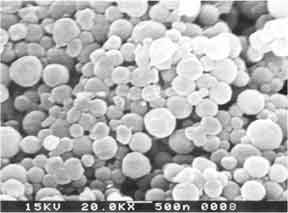Microgels with Acid-Degradable Cross-Linkers for Vaccine and Cytoplasmic Drug Delivery
APPLICATIONS OF TECHNOLOGY:Targeted delivery of protein and DNA-based therapeutics Vaccine delivery Cancer immunotherapy Site-specific treatment of inflammation Anti-sense therapy
ADVANTAGES:
Delivers therapeutic material directly to the cytoplasm of cells Enhances immune response by facilitating cell surface antigen presentation Enables targeted delivery of active payload to cells involved in immune response Allows synthetic flexibility in conjugation of functional groups and drug release kinetics
DESCRIPTION:
Scientists Jean M. J. Frechet and Niren Murthy at Berkeley Lab have developed the first acid-degradable hydrogel nanoparticles that can deliver bioactive material directly to the cytoplasm of targeted cells. The cytoplasmic delivery of vaccines and therapeutics in immune cells facilitates antigen presentation and activates cell-mediated immune responses. The Berkeley Lab microgel opens the door to a new class of microparticles that can be used to deliver vaccines, proteins, peptides, genetic materials and other therapeutic agents specifically to immune cells, tumors, and sites of inflammation.
Protein based vaccines and therapeutics have great potential for treating cancer and infectious diseases such as HIV. The major impediments to the development of protein therapeutics are their inability to enter into the cytoplasm and the lack of an efficient delivery system that protects them from denaturing conditions. Microencapsulation in an acid degradable polymer overcomes both of these problems.
The microgels/nanoparticles are prepared by copolymerizing an acid-degradable crosslinker with a linear polymer, in the presence of the bioactive material(s). The single step polymerization and encapsulation is carried out under mild hydrophilic conditions, thereby preserving the activity of the therapeutic agent. It allows greater variation in the type of encapsulated therapeutic materials, targeted cell types, and drug release kinetics than currently available microencapsulation materials like poly(lactide-co glycolic acid).
The microgels/nanoparticles are stable under physiological conditions but undergo rapid hydrolysis and release trapped therapeutic materials under acidic conditions, such as those present inside lysosomes and at sites of tumors and inflammation. Furthermore, unlike the well studied poly(lactide-co glycolic acid) microspheres, the hydrolysis products of the Berkeley Lab microgels/nanoparticles are neutral and hence the stability of the encapsulated material is better preserved.
Since discovering these new materials, Dr. Frechet and colleagues have demonstrated targeting them to dendritic cells. In a series of ex vivo and in vivo studies they have shown increased receptor-mediated uptake of the targeted microgels/nanoparticles by dendritic cells as well as the migration of particle-carrying dendritic cells to lymph nodes and stimulation of naïve T cells leading to enhanced cellular immune response as confirmed by specific cell lysis and interferon-gamma secretion. In work carried out with collaborators at Stanford University, the inventors have demonstrated that immunostimulatory groups can be attached to the microgels/nanoparticles leading to potentially significant advances in cancer immunotherapy.
Attached files:

Patents:
US 7,056,901
Inventor(s): Jean M. J. Frechet and Niren Murthy
Type of Offer: Licensing
« More Medical Patents
